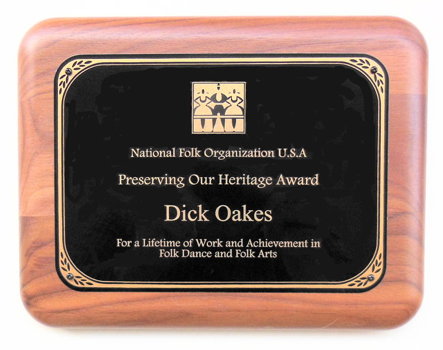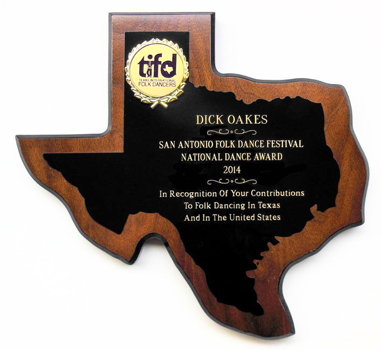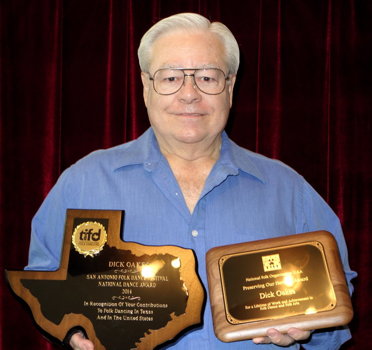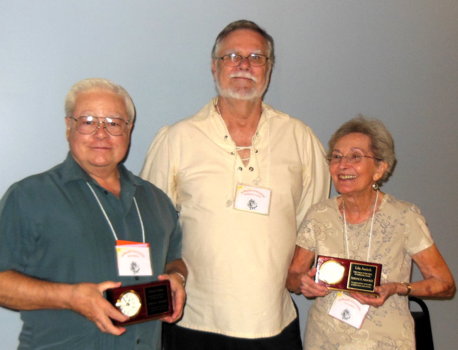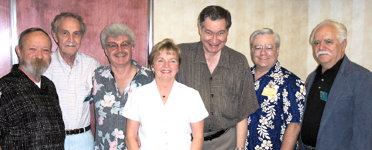Dick Oakes' Awards
CLICK AN IMAGE TO ENLARGE
San Antonio Folk Dance Festival's
National Dance Award 2014
Dick Oakes
By Kathy Molga, President of Veselo Selo Folk Dancers in Anaheim, CA
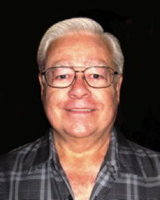 The San Antonio Folk Dance Festival honors Dick Oakes for his vast contribution to preserving International Folk Dancing. His "Phantom Ranch International Folk Dance" website reflects much of the wealth of information that has accumulated over the past century following the introduction of recreational International Folk Dancing in North America. This weekend he is being honored for his personal contributions in teaching and performance, his years of dedication to his Phantom Ranch website, and his contributions to other published resources that further the cause of promoting folk dance and culture.
The San Antonio Folk Dance Festival honors Dick Oakes for his vast contribution to preserving International Folk Dancing. His "Phantom Ranch International Folk Dance" website reflects much of the wealth of information that has accumulated over the past century following the introduction of recreational International Folk Dancing in North America. This weekend he is being honored for his personal contributions in teaching and performance, his years of dedication to his Phantom Ranch website, and his contributions to other published resources that further the cause of promoting folk dance and culture.
Dick Oakes was only in his twenties when he was stationed in San Diego in the Navy and "got hooked" on recreational folk dancing. After only a short while, he began performing with Dolina Cygany and the Viltis Dancers. Since then Dick has taught in more than 75 cities throughout the United States as well as Taiwan and Hong Kong.
Dick has performed with the famed AMAN Folk Ensemble, along with 10 other semi-professional dance troupes. As he continued to teach, Dick observed. Compiled and wrote information based on his experiences and what he found to be unique in so many cultures. Dick co-directed Holiday Camp at Pilgrim Pines in the San Bernardino Mountains of California. The sound movies and stereo slides he took in Bulgaria, Romania, and Yugoslavia are a source of folkloric research material, especially those of the Koprivštica Festival during Bulgaria's 1300th anniversary and Romania's Tismana Festival.
In addition to writing numerous articles on folk dancing and folk cultures, Dick contributed articles to publications such as Folk Dance Scene. He was also wrote the Yugolslavian dance selection to Betty Casey's International Folk Dancing U.S.A. (Doubleday and Company, 1981. 331 pp.).
More recently, Dick has returned to teaching, making two appearances at Veselo Selo Folk Dance club in Anaheim, California. He taught there both in 2010 and 2013. There, dancers came from all over Southern California to greet Dick, thank him, and see him teach once again. As the consummate Master Teacher, Dick introduced the dances by first describing the region of origin, and then giving credit to the Master Teacher who initially brought the dance to North America. Next, he would continue by providing the "back-story of the dance" by stating the meaning of the dance in relation to its village of origin, conveying culture background about the dance had been created, and demonstrating the dance to music, so people could watch for a couple of minutes to see his oen passion for the dance and notice how he remained to its true styling. Finally, while teaching, Dick broke down each movement into easily digestible sets of steps by always saying "watch me" first. he was quick to point out the uniqueness of each movement, by focusing on the details of the meter, the music, and even the meaning of the movement found within the lyrics. This is what makes a Master Teacher.
Dick often spoke about how International Folk Dancing provided him with many years of dancing pleasure as a form of recreation. He wanted to find a way of "giving back" and saw a need for compiling the vast amount of information he had accumulated over the years. He wanted to place this information on a website that could be accessed and freely available to anyone who would be interested. This was the birth of his "Phantom Ranch International Folk Dance" website. The website began as his individual contribution of his own knowledge and personal database, and it quickly grew into something that included the contributions of may other Master Teachers in the folk dance community. It has now become one of the "established resources" for folk dancing information. This is evident in the way that people can access the website, and they can easily locate dance notes, lyrics, pronunciation, and diacritics with pronunciation guidelines, maps, photos, teacher biographies, and articles. Never ask;ing for any financial compensation for his years of labor in compiling this information, Dick shared his gifts of planning, organizing, and writing by creating an invaluable resource with a flair for detail. Not looking for accolades, his "labor of love" has left us with a legacy of research materials for everyone to enjoy for generations to come!
Dick Crum, Morry Gelman, Larry Weiner, Vonnie Brown, Dennis Boxell,
Dick Oakes, Andor Czompo at the 2002 National Folk Organization Conference
